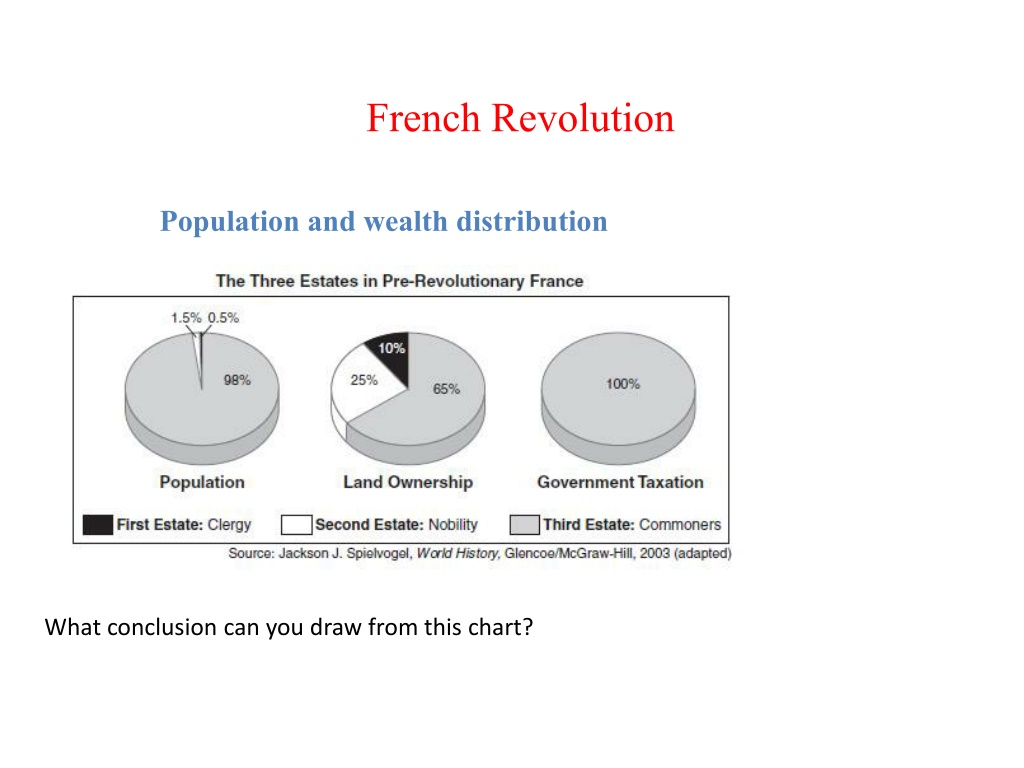
French Revolution Causes and Consequences
Explore the factors leading to the French Revolution, including population and wealth distribution, social classes, the monarchy's actions, and financial crisis. Discover the long-term and short-term causes that culminated in this historic event.
Download Presentation

Please find below an Image/Link to download the presentation.
The content on the website is provided AS IS for your information and personal use only. It may not be sold, licensed, or shared on other websites without obtaining consent from the author. If you encounter any issues during the download, it is possible that the publisher has removed the file from their server.
You are allowed to download the files provided on this website for personal or commercial use, subject to the condition that they are used lawfully. All files are the property of their respective owners.
The content on the website is provided AS IS for your information and personal use only. It may not be sold, licensed, or shared on other websites without obtaining consent from the author.
E N D
Presentation Transcript
French Revolution Population and wealth distribution What conclusion can you draw from this chart?
List and explain the symbolism? What is the message in this political cartoon?
The Three Estates Estate Population Privileges Exemptions Burdens Circa 130,000 Collected the tithe Censorship of the press Control of education Kept records of births, deaths, marriages, etc. Catholic faith held honored position of being the state religion (practiced by monarch and nobility) Owned 20% of the land Paid no taxes Subject to Church law rather than civil law Moral obligation (rather than legal obligation) to assist the poor and needy Support the monarchy and Old Regime First High-ranking clergy Circa 110,000 Collected taxes in the form of feudal dues Monopolized military and state appointments Owned 20% of the land Paid no taxes Support the monarchy and Old Regime Second Nobles Circa 25,000,000 None None Paid all taxes Tithe (Church tax) Octrot (tax on goods brought into cities) Corv e (forced road work) Capitation (poll tax) Vingti me (income tax) Gabelle (salt tax) Taille (land tax) Feudal dues for use of local manor s winepress, oven, etc. Third Everyone else: artisans, bourgeoisie, city workers, merchants, peasants, etc., along with many parish priests
What the King Did Appointed the Intendants, the petty tyrants who governed France s 30 districts Appointed the people who would collect his taxes and carry out his laws Controlled justice by appointing judges Could imprison anyone at any time for any reason (blank warrants of arrest were called lettres de cachet) Levied all taxes and decided how to spend the money Controlled the military Made decisions regarding war and peace Made all laws
France Is Bankrupt The king (Louis XVI) lavished money on himself and residences like Versailles Queen Marie Antoinette was seen as a wasteful spender Government found its funds depleted as a result of wars Including the funding of the American Revolution Deficit spending a government spending more money than it takes in from tax revenues Privileged classes would not submit to being taxed
Long- and Short-term Causes Long-term causes Also known as underlying causes Causes which can stem back many years Short-term causes Also known as immediate causes Causes which happen close to the moment the change or action happens Example: A person is fired from his or her job. Long-term cause(s): The person is often late to work and is generally unproductive on the job. Short-term cause(s): The person fails to show up for work and does not call the employer. Key: One typically does not happen without the other. Events which bring important change (or action) need both long-term and short-term causes.
Long-term Causes of the French Revolution Everything previously discussed Also Absolutism Unjust socio-political system (Old Regime) Poor harvests which left peasant farmers with little money for taxes Influence of Enlightenment philosophes System of mercantilism which restricted trade Influence of other successful revolutions England s Glorious Revolution (1688-1689) American Revolution (1775-1783)
Short-term Causes of the French Revolution Bankruptcy Great Fear Estates-General Caused by deficit spending Financial ministers (Turgot, Necker, Calonne) proposed changes But these were rejected Assembly of Notables voted down taxation for the nobility in 1787 Worst famine in memory Hungry, impoverished peasants feared that nobles at Estates- General were seeking greater privileges Attacks on nobles occurred throughout the country in 1789 Louis XVI had no choice but to call for a meeting of the Estates- General to find a solution to the bankruptcy problem All three estates Had not met since 1614 Set in motion a series of events which resulted in the abolition of the monarchy and a completely new socio- political system for France
Tennis Court Oath The Third Estate declared itself to be the National Assembly. Louis XVI responded by locking the Third Estate out of the meeting. The Third Estate relocated to a nearby tennis court where its members vowed to stay together and create a written constitution for France. On June 23, 1789, Louis XVI relented. He ordered the three estates to meet together as the National Assembly and vote, by population, on a constitution for France.
The Tennis Court Oath The National Assembly, considering that it has been summoned to establish the constitution of the kingdom, to effect the regeneration of the public order, and to maintain the true principles of monarchy; that nothing can prevent it from continuing its deliberations in whatever place it may be forced to establish itself; and, finally, that wheresoever its members are assembled, there is the National Assembly; Decrees that all members of this Assembly shall immediately take a solemn oath not to separate, and to reassemble wherever circumstances require, until the constitution of the kingdom is established and consolidated upon firm foundations; and that, the said oath taken, all members and each one of them individually shall ratify this steadfast resolution by signature.
